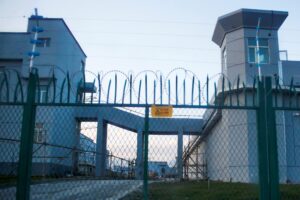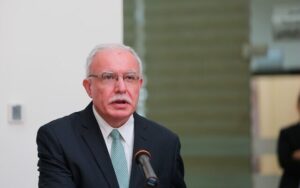
The National Interest Foundation Newsletter
Issue 89, March 25, 2021
Welcome to our NIF Newsletter. In this week’s headlines: the United States, the European Union, and others impose sanctions on Chinese regime officials for major human rights abuses committed against the Uyghurs in Xinjiang, Israel holds its 4th national election in the span of 2 years with continued political deadlock expected, the Biden administration blacklists additional members of the Myanmar military junta involved in the recent coup there and the ongoing deadly crackdown, and Israeli officials revoke the permit of Palestinian Foreign Minister Riyad al-Maliki for supporting the International Criminal Court’s investigation into Israeli war crimes in the illegally-occupied Palestinian territories.
Sanctions Against Chinese Regime Officials

The Chinese government has drawn widespread condemnation for its Uyghur detention camps in the Xinjiang province. (Photo from Reuters)
The United States, the European Union, and Others Impose Sanctions on Chinese Regime Officials
This week, the United States, the European Union, and others placed sanctions on Chinese regime officials for major human rights abuses committed against the Uyghurs in Xinjiang. In recent years, the Chinese government has drawn widespread condemnation for its Uyghur internment camps in the northwest province, with rights activists and experts estimating that there are over 375 facilities where between 1 and 3 million people have been arbitrarily detained. The latest punitive measures are part of a growing coordinated effort by Western allies to hold Beijing accountable for the disturbing violations which include evidence of torture, violence, and forced labor. The sanctions target senior officials in Xinjiang who are suspected of being directly involved in the overseeing of the mass detention centers. Due to its scale and systematic nature, many analysts point to the alarming abuses being perpetrated against the Uyghur Muslim ethnic minority in China as one of the worst human rights crises of the contemporary era.
March 2021 Israeli Election

Israel’s fourth election in two years looks to have ended inconclusively. (Photo from AP)
Israel Holds Its 4th National Election in the Span of 2 Years with Continued Political Deadlock Expected
Israel’s fourth election in two years appears to have ended in stalemate, as no party won enough seats to claim a majority. Embattled and criminally-indicted incumbent Prime Minister Benjamin Netanyahu’s Likud Party and its allies won the most parliamentary seats in Israel’s Knesset, but remain short of the needed 61 for an outright majority. Israel’s election was triggered by the dissolution of a coalition government involving Netanyahu and Benny Gantz, which fell apart after Netanyahu reneged on a promise to hand power to Gantz. Despite Likud’s success compared to any other single political party at the ballot box, the prospects for breaking the gridlock and forming a new coalition government are slim. If neither Netanyahu nor his opponents in the anti-Netanyahu bloc are able to do so, Israel will be headed towards an unprecedented fifth consecutive election in the coming months.
Blacklisting of Myanmar Military Junta Members

Myanmar’s military junta has been engaged in a lethal crackdown against its own citizens. (Photo from AFP)
The Biden Administration Blacklists Additional Members of the Myanmar Military Junta
Under the Biden administration, the United States has imposed sanctions on several additional officials from the Myanmar military junta in the wake of the country’s ongoing deadly crackdown against pro-democracy and anti-coup protesters. The Treasury Department announced this week that Myanmar’s chief of police and two military units involved in the violent suppression of peaceful demonstrations had been blacklisted. These sanctions are supplementary to those already placed on several top junta members in recent weeks. Some of Myanmar’s top military officials, their adult children, and the companies they own are under a variety of prohibitions, including an asset and visa freeze. The American sanctions this week followed similar embargoes enforced by the European Union on Monday.
Revoking of Palestinian Foreign Minister’s Permit

The move coincided with al-Maliki’s return from a diplomatic trip to Europe, which included a visit to the ICC. (Photo from WAFA)
Israeli Officials Revoke the Permit of Palestinian Foreign Minister al-Maliki
Israeli officials have revoked the travel permit of Palestinian Foreign Minister Riyad al-Maliki as retaliation for support of the International Criminal Court’s (ICC) investigation into Israeli war crimes in the illegally-occupied Palestinian territories. The move coincided with al-Maliki’s return to the West Bank from a diplomatic trip to Europe, which included a visit to the ICC and its Chief Prosecutor Fatou Bensouda. During his meeting with Bensouda, al-Maliki stressed the importance of expediting the probe in order to hold Israel accountable for its destructive policies and ensure justice for Palestinian victims and their families. Independent human rights groups and experts have praised the prospect of an investigation, stating that it is a positive step forward in the decades-long advocacy efforts to end impunity regarding Israel’s actions in its illegal occupation of Palestinian territory. Thus, the decision to revoke al-Maliki’s permit for expressing a position that has a wide array of support is problematic, as the international community widely views Israeli behavior such as settlement expansion and other violations as major obstacles to the peace process.
Enter the text or HTML code here
